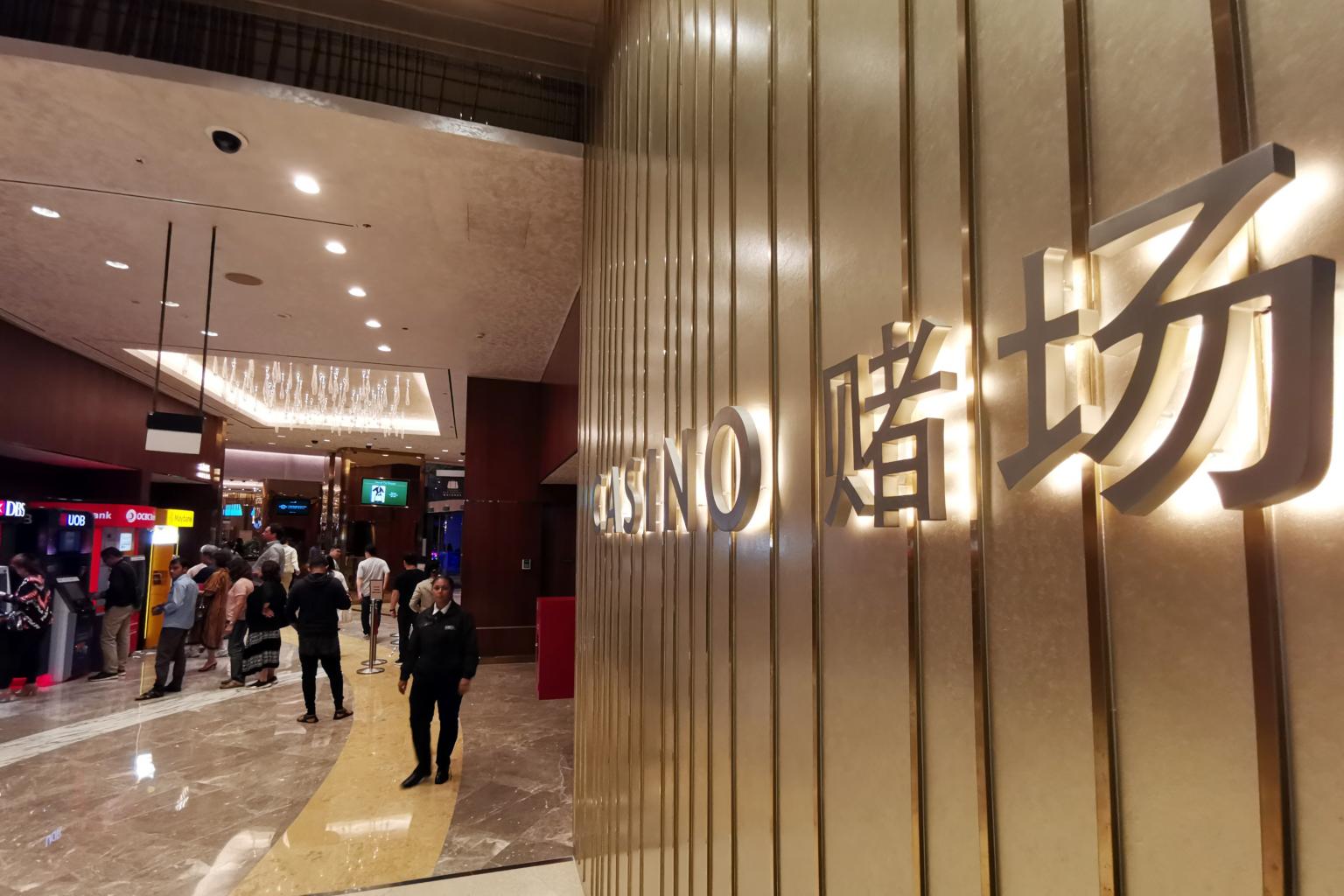Casino patrons could receive alerts on how much time and money they have spent to encourage responsible gambling
Sign up now: Get ST's newsletters delivered to your inbox

In April this year, entry fees to Singapore casinos were raised when the Government announced expansion plans of the two integrated resorts here.
PHOTO: LIANHE ZAOBAO
SINGAPORE - Casino patrons in Singapore could soon receive personalised alerts on the amount of time and money they have spent at a casino.
This would be part of efforts to encourage responsible gambling which will mitigate the risk of problem gambling, said Manpower Minister and Second Minister for Home Affairs Josephine Teo on Thursday (Aug 29).
She added that Singapore's Casino Regulatory Authority (CRA) was working together with the casinos on measures which could also include the option of having casino patrons self-regulate their gambling habits by voluntarily setting caps on their expenditure and time spent at the tables.
Mrs Teo was addressing gambling regulators and officials from law enforcement agencies from around the world at the Fifth Singapore Symposium on Gambling Regulation and Crime.
She told them that Singapore is learning from responsible gaming measures that other jurisdictions have introduced, such as the Massachusetts Gaming Commission.
The Boston-based gaming regulator has put in place GameSense Information Centres at various casinos, where advisers provide patrons with information to help them make better informed decisions about their gambling habits. This could be about adopting healthy gambling habits, setting spending limits and understanding how the casino games work so that they know how the odds are stacked against them.
"In Singapore, there are also several efforts on responsible gambling. For example, the Responsible Gambling Forum, which comprises industry and community leaders, organises events such as the annual Responsible Gambling Awareness Week to raise awareness," said Mrs Teo, who noted that online gambling with Singapore Pools requires patrons to set expenditure and loss limits so that punters can manage the financial impact of their gambling.
In April this year, entry fees to Singapore's casinos were raised when the Government announced the $9 billion expansion plans of the two integrated resorts here. The authorities also said the exclusivity period for both casinos would be extended to end-2030.
With changes to the gambling landscape, Mrs Teo stressed the need for gambling regulators to continue learning from one another, saying: "Regulators and law enforcement agencies need to keep up to date with these developments and make sure our policies and rules remain effective."
One challenge that regulators have to deal with is the change brought about by technology that has led to an increase in online gambling.
"From their smartphones, punters can access gambling products anywhere, anytime. Across the world, online gambling has been on the rise," said Mrs Teo.
She said Singapore too has seen such a trend, and about 60 per cent of Singapore Pool's sports betting turnover is now done through remote channels, a stark increase from the 30 per cent just three years ago.
"We expect this trend to continue... The market size of Asia-Pacific online gambling will grow almost threefold, more than the rest of the world," she added.
Another challenge that regulators are facing is the development of new gaming products to suit the preferences of the younger generation who are less interested in traditional gambling products like jackpot machines and horse racing.
"Regulators around the world will need to figure out how to regulate these products," she said, citing how some products have morphed to resemble computer games that appear to be skills-based or allow patrons to make decisions during the game.
Meanwhile, computer and mobile gaming products have also incorporated elements of gambling, for example virtual loot boxes, which contain randomised in-game items that gamers can purchase. The reward in the loot box can include top prizes that can enhance the game experience.
Said Mrs Teo: "Such new products across various modes of gambling or gaming will require us to put on our thinking caps and take a look at new laws to regulate."
Regulators can also learn from the ways that other jurisdictions address law and order concerns, especially those regarding money laundering and terrorism financing.
More can and needs to be done, and as it is, some regulators have made good use of data analytics to tackle these areas, said Mrs Teo.
She cited the French Online Gaming Regulatory Authority which uses data to detect money laundering, match fixing, and to study the behaviour of players.
"CRA is also exploring how data analytics can be used to gain insights on the risk profiles of patrons and identify characteristics of patrons who pose regulatory risks," said Mrs Teo.
"Such insights can be used to support policy development and enhance CRA's risk management."


